- Home
- Dana Cameron
Site Unseen Page 20
Site Unseen Read online
Page 20
“Looks like there was another sheet too,” Stannard noted. He pointed. “See? That top corner shows that another sheet was folded back on the original photocopy.”
“But where did he get it?” I worried, more to myself than to him. “I mean, I’ve looked everywhere. And he’s got it stuck next to his coupons! I couldn’t have missed it, could I?”
Something else caught my eye. One of the numbers on the phone list was darker, less faded than the others, and I realized with a start that I recognized it. “Holy snappers, how did that get there?”
“I was wondering whether you’d notice that,” Stannard said. “It’s not marked, but you can imagine how surprised we were to find it there.”
I felt a cold sweat break out across my back and shivered. “It’s the number for the anthropology department at Caldwell! Jesus, was he calling about me?”
“I was thinking just that,” Stannard replied. “You should check with your department and confirm that he was asking after you. Maybe it was just—you know, like a crank.”
He turned back to the bulletin board. “So why is Tichnor dead?” he asked the advertisements and coupons. “The fort. Ms. Westlake. Why is he dead? There’s lots going on but no reason for it all yet. We just get more questions to answer our questions…”
“Same with archaeologists,” I said, equally distracted. “Who, what, where, when, why.”
Stannard looked at me sharply. “I don’t want you getting ideas about playing Nancy Drew here! This is a matter of information, not action, you got that?!”
“Well, yeah, but you wouldn’t have brought me up here if you didn’t think I could help.”
“I brought you up here to satisfy myself that you’d never been here before, that’s all,” he snapped, “and to get your impressions of the place. There’s no reason for you to get any more involved than that.”
But I wasn’t going to be put off now that he’d given me the idea, and I could tell he wasn’t so convinced himself. “I’m bound to hear something, people around here talk and they know me. All I’m asking”—and it wasn’t until that very moment that I realized I was asking for something—“is that you tell me about whatever you discover. Then I’ll tell you whatever I find—”
I clammed up suddenly, aware that I had just blown it.
The sheriff turned on me. “I expect you’ll tell me whatever you know in any case! Anything less is obstruction,” he said shortly. There was a long pause while he debated. “If I come up with anything I think you can tell me about, I’ll be in touch. You hear anything, you call me immediately. No messing around! Don’t make me regret trusting you like this.”
He looked worried, like trusting me was going to get him into a lot of trouble. I just nodded, grateful for his admission and grateful for a sense of direction at last.
Chapter 16
CLASSES BEGAN THREE WEEKS LATER, AND THAT FRIDAY, I was trapped in a faculty meeting. This was surely the sort of thing Dante had in mind in filling the rings of his hell with poetically just torments: I had slaved my whole professional life to be in that stuffy little room. As individuals, the faculty members of Caldwell College’s Anthropology Department couldn’t have been more different, ranging from our soon-to-be-emeritus chair, Daniel Kellerman, to me, the newest member. Kellerman was indeed, as Brian had once described, a “dried-up old mummy man,” with great tufts of white hair growing out of his ears and nose that gave him a vaguely rabbity look as well. Rick Crabtree, with his plump, dissatisfied face and dark hair slicked over a wide bald patch, sat with his lips pursed so tightly it made mine ache just to look at him. Next to me was Jenny Alvarez, long gray hair caught up in a leather tie, still wearing the same clothes she’d owned in the 1970s—styles that were just now coming back into fashion. Gretchen Renekker, our doe-eyed pre-Raphaelite princess of political correctness, sat next to Rick Crabtree, setting us an example, I was sure, of how we ought to value his age and wisdom, and look past his bigoted nature, narrow mind, and dated research. Larry Chapman sat across from her, a lanky Cockney in a bolo string tie, a linguist who pined for the Old West of cowboy movies but settled for New England.
Tony Markham, of course, looked as cool as ever, and I noticed that some of the others were already referring their questions to him, as if he had already taken over sleepy old Kellerman’s position, as we all expected. It made sense; Tony seemed to be the only one capable of getting things done with the administration, after all, and he just seemed to be a born leader. I thought that it was funny; even in a room full of hardheaded academics with big egos, Tony still came off as the one in charge.
But as a single entity, trapped en masse, the rest of my colleagues were indistinguishable from one another, monochrome in dull shades of boredom and irritability. Most of us were eager to have done with the petty details involved in the day-to-day business of running the department and ready to abandon the campus for the weekend. The first hour of such a meeting can be borne with dutiful energy, the next with grim fortitude. Any half hour after that must be got through by any means available. For some, this meant shifting in chairs and doodling, waiting for their business to come to the table; for others, it meant a display of power, dickering over small and large points; for still others, it was taking refuge in daydreams.
Even Chuck, our department’s administrator, usually curious about everything, must have picked up the scent of frustration and boredom, because after he dropped off the coffee, he all but scampered away from the room, Birkenstocks flapping down the hallway. I wished I could follow him.
I was particularly eager to flee; I had already had a hellish day before the faculty meeting began, and a rushed week before that. No sooner had Brian helped me move my things back to our Massachusetts apartment and I had delved into preparation for classes, than it seemed I had to move back to my campus apartment in Maine and begin our second year of weekly autumnal migration for conjugal weekends. We were trying to re-create a normal life after a dreadful summer, but there is nothing normal to begin with about a commuting marriage.
Classes had started, and while I was pretty well on top of my lectures, rumors about the events on the site had begun to fly. There had been talk, hushed, unofficial, and pernicious, about what was being called “the Westlake bequest” and my proximity to her death, and only that morning Dr. Kellerman had suggested a leave of absence on half pay, until “things were cleared up.” I startled both of us by giving him a curt response in the negative, and then, having no doubt that it was the work of the dean, went to pay him an unannounced visit as well. Having nothing to lose, I marched into Dean Belcher’s office and told him that he could fire me, in which case my lawyer would be on the college like white on rice, or he could leave me alone, and I could continue to be a productive member of the campus community. He agreed quickly, and I left, surprised at my preemptive strike. It felt like the beginning of things, or maybe the end, and so I was feeling particularly penned up, irritated with my colleagues arguing over academic minutiae.
I looked at my watch surreptitiously; there was nearly half a page left to the agenda by two-thirty. The meeting had started at ten, with only a half hour for lunch. I was dying a slow death of boredom and exhaustion; I’d spent the night in my office trying desperately to catch up on all the little crap jobs that had been shoved my way because I was the junior member. It was just a sort of professional hazing, with no conscious thought but to reinforce department hierarchies and take a little of the load off my fellow professors, but it was grueling work. I pounded through the memos I needed to draft on introductory textbook recommendations, computer equipment acquisitions, and language exam schedules. By four A.M. I had finished proofing the departmental newsletter, and had just enough strength to crawl over to the couch and collapse. At eight forty-five I awoke, cursing the birds that sang in the ivy outside my windows, even though they provided me with the opportunity to scuttle back to my apartment and shower hastily.
Finally, just as I was trying to fig
ure out whether dire boredom actually reduced the amount of oxygen in the room, Kellerman wrapped things up with “If that’s all, people?”
No one said anything. The others would have killed him.
“Well, have a good weekend.”
People stretched and collected their belongings, and shuffled out of the room. I all but ran for the ladies’ room for a much-needed break and then hurried back to my office. I flung my notepads down on the desk, where they were immediately camouflaged amid the surrounding clutter. I called Brian at work and got the terse, vexed-sounding message on his answering machine. It never sounded to me like the sweet man I knew at home.
“I’m busy. Leave a message if you have to.” There was, as usual, the background noise that was never meant to be recorded, the sounds of Brian fumbling to turn off the machine as he half-sang to himself, “o-ther-wise, leee-eave meeee a-lone.” The righteous dub of a Ziggy Marley song playing somewhere in the vicinity didn’t make the message sound any more professional.
I started in with my usual preamble. “Brian, you promised me you’d change this wretched tape. People will think—”
“People will think that I am a rude boy and want to be left alone, which is entirely correct. This ain’t the diplomatic corps.” Brian had suddenly picked up his phone, interrupting my recital. “Hey, pork chop, you just caught me going out the door. What bus are you going to be on?”
“The early one,” I said. “I’m not sticking around here any longer, I’ll go crazy.”
“Good for you; why risk a trip to the funny farm if you can be home with me? How was the faculty meeting, or should I ask?”
“Not until you hand me a largish drink, unsullied by additives or ice. I’m still in the throes of the backlash. And I’m just realizing what I said to the dean.”
“Ouch,” he said sympathetically.
Jenny Alvarez stuck her head in the door. “Have a good weekend, Em,” she whispered before making her own escape. I waved to her.
“It’s not all that bad,” I said. “I’ll tell you all about it later, I just wanted to check in. Do you need me to pick up anything on the way, or should we go out?”
“We’re staying in. Kam is coming over tonight, so he and I will cook. You can swing by the bakery outside the station, if you think of it, and pick up a couple of loaves of bread. We might get a movie or something too.”
“Where’s Marty going to be, if himself is with us?”
“New York, working late with the Wilmerdings.”
The thought of a normal weekend was almost too much to bear, and I felt myself tearing up. “Look, I’ve got to get going or I’ll never make the bus. I’ll see you in a couple of hours, sweetie. Love you.”
“Okay, see you in a bit. Love you too. Bye.”
I sighed; living apart was very trendy and all, but it was getting harder and harder to carry off cheerfully. Still, it kept a marriage from becoming stale through familiarity. I could use some of that familiarity right now myself, though, I thought vehemently. Well past time for it.
I stuffed a couple of books into my briefcase, thought better of it, and decided to celebrate by dumping them back onto the desk. They could wait until Monday. I wouldn’t be any more behind than I was already, and I felt as though life was very nearly on an upswing.
Purely by reflex, however, I decided to have a quick look in the storage room on my way out of the building, to check on the state of field supplies. I’d be heading back to close up the site next weekend, and it was amazing how a little thing like no artifact bags could throw a project into chaos. I unlocked the door to the small room and flicked on the light. The metallic smell of dusty field equipment tanged with musty canvas assaulted my nose. Shovels and screens lined the wall on the left, and the back and right sides were covered with metal shelving and cases for smaller gear. After mentally noting that I’d need to order more marker pens, I turned to leave the room when I noticed something out of place out of the corner of my eye.
Early in our relationship, after observing the postapocalyptic state of my apartment, Brian, in frustration, asked how I could be successful in a profession that depended on the rigorous maintenance of order. “How can you live in such a sty and yet be such a control freak in the field? I would have thought the two concepts would be mutually exclusive,” he’d asked.
I’d shrugged. “It’s not the same. At home, everything is a known quantity. I know what is clean laundry and what is not; I know which pile has what sort of books. If you don’t throw anything out, then you don’t have to worry about not being able to find it again later. You know it’s all there, and the randomness occasionally helps make connections between things you wouldn’t have thought related before.
“On the other hand, everything in the field is an x-factor. You can never take anything for granted, never assume anything. It’s the unknown that requires precision.” My messy habits were an issue that had never been fully resolved, and still occasionally flared up between us while we were forced to share office space.
It was that sense of something inherently out of place that caused me to glance over toward the back, where a wide gray metal map file stood. The middle drawer was partially open, caught on the corners of a pile of maps sticking out.
Wretched students, I thought, with a momentary flicker of irritation. The drawer that was open was the one that held maps of New England, and so subsequently contained many of my own personal maps. The students were allowed to use them only as long as they treated them carefully. But these had been jammed in any which way, left to tear.
I opened the drawer fully to reorganize the maps and began to sort them out. My ire grew as I realized that they were the maps of the site at Penitence Point; someone’s head would roll when I found out who’d been in here last, I thought. I separated the maps, straightened them, and settled them back in, long bottom edges aligned so that the names were easily visible. My fingernail caught on the edge of a map that had been shoved deep between two large USGS sheets, and I pulled it out to set it flush with the others.
It was a photocopied map. Just like the one that Sheriff Standard had shown me in Grahame Tichnor’s kitchen.
I pulled it all the way out and stared at it in confusion. It can’t be mine, I thought, I would have remembered this, it’s not in my map notes.
So what the bloody hell is another copy of it doing here?
I scowled at the inoffensive piece of paper and slid it into my briefcase. I didn’t have time to worry about it now; I’d be late for my bus. As I was sliding the drawer shut, however, the doorknob to the storage room rattled, startling me, and I slammed my thumb in the drawer.
A rainbow arc of pain shot across my vision, and I barely managed to get my thumb out before the drawer slid back shut again. “Oh Jesus, that hurts!” I yelled, sticking my thumb into my mouth. I looked up to see who had come in, wishing no good upon whoever it was.
Tony Markham was taken aback; I had scared him too. I held up my thumb, which was hot with throbbing, to show him. “I caught myself good in the drawer,” I said. At least the skin wasn’t broken. “I’m sorry, I didn’t mean to scream like that.”
Collecting himself, Tony was solicitous. “Oh no, I’m sorry,” he drawled. “I didn’t mean to startle you so.”
“No, not your fault,” I said, a bit shakily. “I guess I’m just overtired. It’s been a long week.”
“Can you wiggle your thumb?”
I did, although it was painful to do so.
“You should get some ice on that,” Tony suggested. “Have you got time for a drink now? One for you and one for your hand. There’s a couple of things we should discuss.”
I made a disappointed face. “I’m sorry, I can’t, Tony. I’m running late now. Maybe a rain check?”
Tony frowned. “Well, I don’t like to leave it, you really ought to know. Rick Crabtree’s been acting strangely when your name’s come up lately.”
“Ah. How, strangely?” It had to do with Al
an, I guessed, but I was wrong.
“He was the one who suggested to Kellerman that you ought to withdraw for a while. I don’t know his reasons,” Tony said briefly. “This really isn’t the time or the place, but you need to be aware of that.”
“Thanks.” I mulled that over for a minute, my thumb in my mouth. “I had no idea he felt this strongly against me.” I’d really have to find out what was making Rick act so irrationally.
“I’m a little worried about it myself,” Tony agreed. “Actually, I’m more worried about you. You’ve been under a tremendous strain lately. Are you really all right?”
“Yeah, I’m doing okay, I think.” I didn’t want to tell him how frustrated I was in trying to discover what interest Grahame Tichnor had in Penitence Point; if I got on that riff, we might be in the storage room all day.
“What can you pare off your schedule? How about your lectures, have you got them all under control?”
“I’m in pretty good shape there—”
“Can you leave off work at the site until next spring, for example?”
“That’s the one thing I can’t leave, Tony. I’m doing all right, though, thanks.” I was starting to get a little irked with his offers; I really did prefer to take care of things myself. Perhaps he thought I was too green to manage on my own. “I’m sorry, I’m keeping you from whatever you were going to do in here,” I apologized.
“Not at all. I heard noises,” he explained. “I wanted to make sure that no one was in here before I locked up. Everyone else has left.”
“That’s funny,” I said, picking up my briefcase. “Chuck usually makes the pretense of staying until five, or at least until we’re all gone. It must be the nice weather.”

 Hellbender (Fangborn Book 3)
Hellbender (Fangborn Book 3) Hellbender (The Fangborn Series Book 3)
Hellbender (The Fangborn Series Book 3) Hellbender
Hellbender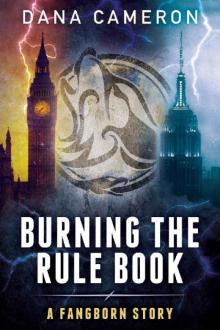 Burning the Rule Book
Burning the Rule Book Site Unseen
Site Unseen Ashes and Bones
Ashes and Bones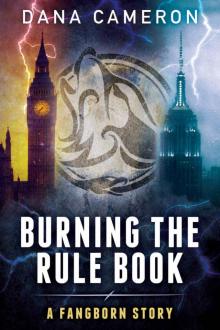 Burning the Rule Book (A Fangborn Story 3)
Burning the Rule Book (A Fangborn Story 3)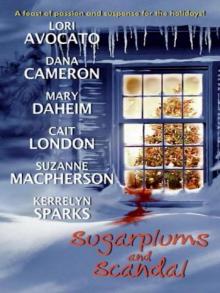 Sugarplums and Scandal
Sugarplums and Scandal The Curious Case of Miss Amelia Vernet
The Curious Case of Miss Amelia Vernet More Bitter Than Death
More Bitter Than Death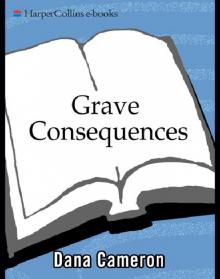 Grave Consequences
Grave Consequences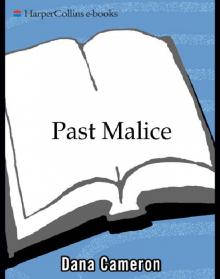 Past Malice
Past Malice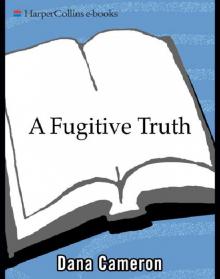 A Fugitive Truth
A Fugitive Truth Seven Kinds of Hell
Seven Kinds of Hell